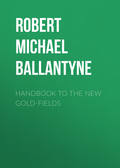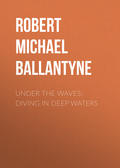
Robert Michael Ballantyne
Dusty Diamonds Cut and Polished: A Tale of City Arab Life and Adventure
At last they observed Mrs Frog’s scarlet shawl—which was very conspicuous—and her son, and tried to look unconscious, and wondered with quite needless surprise where Matty could have gone to.
Bobby Frog, being a sharp youth, noted these things, but made no comment to any one, for the air of Canada had, somehow, invested this waif with wonderful delicacy of feeling.
Although Bob and his mother left off talking of Ned Frog somewhat abruptly, as well as sorrowfully, it does not follow that we are bound to do the same. On the contrary, we now ask the reader to leave Brankly Farm rather abruptly, and return to London for the purpose of paying Ned a visit.
Chapter Twenty Seven.
A Strange Visit and its Results
Edward Frog, bird-fancier, pugilist, etcetera, (and the etcetera represents an unknown quantity), has changed somewhat like the rest, for a few years have thinned the short-cropped though once curly locks above his knotted forehead, besides sprinkling them with grey. But in other respects he has not fallen off—nay he has rather improved, owing to the peculiar system of diet and discipline and regularity of life to which, during these years, he has been subjected.
When Ned returned from what we may style his outing, he went straight to the old court with something like a feeling of anxiety in his heart, but found the old home deserted and the old door, which still bore deep marks of his knuckle, on the upper panels and his boots on the lower, was padlocked. He inquired for Mrs Frog, but was told she had left the place long ago,—and no one knew where she had gone.
With a heavy heart Ned turned from the door and sauntered away, friendless and homeless. He thought of making further inquiries about his family, but at the corner of the street smelt the old shop that had swallowed up so much of his earnings.
“If I’d on’y put it all in the savin’s bank,” he said bitterly, stopping in front of the gin-palace, “I’d ’ave bin well off to-day.”
An old comrade turned the corner at that moment.
“What! Ned Frog!” he cried, seizing his hand and shaking it with genuine goodwill. “Well, this is good luck. Come along, old boy!”
It was pleasant to the desolate man to be thus recognised. He went along like an ox to the slaughter, though, unlike the ox, he knew well what he was going to.
He was “treated.” He drank beer. Other old friends came in. He drank gin. If good resolves had been coming up in his mind earlier in the day he forgot them now. If better feelings had been struggling for the mastery, he crushed them now. He got drunk. He became disorderly. He went into High Street, Whitechapel, with a view to do damage to somebody. He succeeded. He tumbled over a barrow, and damaged his own shins. He encountered Number 666 soon after, and, through his influence, passed the night in a police cell.
After this Ned gave up all thought of searching for his wife and family.
“Better let ’em alone,” he growled to himself on being discharged from the police-office with a caution.
But, as we have said or hinted elsewhere, Ned was a man of iron will. He resolved to avoid the public-house, to drink in moderation, and to do his drinking at home. Being as powerful and active as ever he had been, he soon managed, in the capacity of a common labourer, to scrape enough money together to enable him to retake his old garret, which chanced to be vacant. Indeed its situation was so airy, and it was so undesirable, that it was almost always vacant. He bought a few cages and birds; found that the old manager of the low music-hall was still at work and ready to employ him, and thus fell very much into his old line of life.
One night, as he was passing into his place of business—the music-hall—a man saw him and recognised him. This was a city missionary of the John Seaward type, who chanced to be fishing for souls that night in these troubled waters. There are many such fishermen about, thank God, doing their grand work unostentatiously, and not only rescuing souls for eternity, but helping, more perhaps than even the best informed are aware of, to save London from tremendous evil.
What it was in Ned Frog that attracted this man of God we know note but, after casting his lines for some hours in other places, he returned to the music-hall and loitered about the door.
At a late hour its audience came pouring out with discordant cries and ribald laughter. Soon Ned appeared and took his way homeward. The missionary followed at a safe distance till he saw Ned disappear through the doorway that led to his garret. Then, running forward, he entered the dark passage and heard Ned’s heavy foot clanking on the stone steps as he mounted upwards.
The sound became fainter, and the missionary, fearing lest he should fail to find the room in which his man dwelt—for there were many rooms in the old tenement—ran hastily up-stairs and paused to listen. The footsteps were still sounding above him, but louder now, because Ned was mounting a wooden stair. A few seconds later a heavy door was banged, and all was quiet.
The city missionary now groped his way upwards until he came to the highest landing, where in the thick darkness he saw a light under a door. With a feeling of uncertainty and a silent prayer for help he knocked gently. The door was opened at once by a middle-aged woman, whose outline only could be seen, her back being to the light.
“Is it here that the man lives who came up just now?” asked the missionary.
“What man?” she replied, fiercely, “I know nothink about men, an’ ’ave nothink to do with ’em. Ned Frog’s the on’y man as ever comes ’ere, an’ he lives up there.”
She made a motion, as if pointing upwards somewhere, and banged the door in her visitor’s face.
“Up there!” The missionary had reached the highest landing, and saw no other gleam of light anywhere. Groping about, however, his hand struck against a ladder. All doubt as to the use of this was immediately banished, for a man’s heavy tread was heard in the room above as he crossed it.
Mounting the ladder, the missionary, instead of coming to a higher landing as he had expected, thrust his hat against a trap-door in the roof. Immediately he heard a savage human growl. Evidently the man was in a bad humour, but the missionary knocked.
“Who’s there?” demanded the man, fiercely, for his visitors were few, and these generally connected with the police force.
“May I come in?” asked the missionary in a mild voice—not that he put the mildness on for the occasion. He was naturally mild—additionally so by grace.
“Oh! yes—you may come in,” cried the man, lifting the trap-door.
The visitor stepped into the room and was startled by Ned letting fall the trap-door with a crash that shook the whole tenement. Planting himself upon it, he rendered retreat impossible.
It was a trying situation, for the man was in a savage humour, and evidently the worse for drink. But missionaries are bold men.
“Now,” demanded Ned, “what may you want?”
“I want your soul,” replied his visitor, quietly.
“You needn’t trouble yourself, then, for the devil’s got it already.”
“No—he has not got it yet, Ned.”
“Oh! you know me then?”
“No. I never saw you till to-night, but I learned your name accidentally, and I’m anxious about your soul.”
“You don’t know me,” Ned repeated, slowly, “you never saw me till to-night, yet you’re anxious about my soul! What stuff are you talkin’! ’Ow can that be?”
“Now, you have puzzled me,” said the missionary. “I cannot tell how that can be, but it is no ‘stuff’ I assure you. I think it probable, however, that your own experience may help you. Didn’t you once see a young girl whom you had never seen before, whom you didn’t know, whom you had never even heard of, yet you became desperately anxious to win her?”
Ned instantly thought of a certain woman whom he had often abused and beaten, and whose heart he had probably broken.
“Yes,” he said, “I did; but then I had falled in love wi’ her at first sight, and you can’t have falled in love wi’ me, you know.”
Ned grinned at this idea in spite of himself.
“Well, no,” replied the missionary, “not exactly. You’re not a very lovable object to look at just now. Nevertheless, I am anxious about your soul at first sight. I can’t tell how it is, but so it is.”
“Come, now,” said Ned, becoming suddenly stern. “I don’t believe in your religion, or your Bible, or your prayin’ and psalm-singin’. I tell you plainly, I’m a infidel. But if you can say anything in favour o’ your views, fire away; I’ll listen, only don’t let me have any o’ your sing-songin’ or whinin’, else I’ll kick you down the trap-door and down the stair an’ up the court and out into the street—speak out, like a man.”
“I will speak as God the Holy Spirit shall enable me,” returned the missionary, without the slightest change in tone or manner.
“Well, then, sit down,” said Ned, pointing to the only chair in the room, while he seated himself on the rickety table, which threatened to give way altogether, while the reckless man swung his right leg to and fro quite regardless of its complainings.
“Have you ever studied the Bible?” asked the missionary, somewhat abruptly.
“Well, no, of course not. I’m not a parson, but I have read a bit here and there, an’ it’s all rubbish. I don’t believe a word of it.”
“There’s a part of it,” returned the visitor, “which says that God maketh his rain to fall on the just and on the unjust. Do you not believe that?”
“Of course I do. A man can’t help believin’ that, for he sees it—it falls on houses, fields, birds and beasts as well.”
“Then you do believe a word of it?”
“Oh! come, you’re a deal too sharp. You know what I mean.”
“No,” said his visitor, quickly, “I don’t quite know what you mean. One who professes to be an infidel professes more or less intelligent disbelief in the Bible, yet you admit that you have never studied the book which you profess to disbelieve—much less, I suppose, have you studied the books which give us the evidences of its truth.”
“Don’t suppose, Mr parson, or missioner, or whatever you are,” said Ned, “that you’re goin’ to floor me wi’ your larnin’. I’m too old a bird for that. Do you suppose that I’m bound to study everything on the face o’ the earth like a lawyer before I’m entitled to say I don’t believe it. If I see that a thing don’t work well, that’s enough for me to condemn it.”
“You’re quite right there. I quite go with that line of reasoning. By their fruits shall ye know them. A man don’t usually go to a thistle to find grapes. But let me ask you, Ned, do you usually find that murderers, drunkards, burglars, thieves, and blackguards in general are students of the Bible and given to prayer and psalm-singing?”
“Ha! ha! I should rather think not,” said Ned, much tickled by the supposition.
“Then,” continued the other, “tell me, honestly, Ned, do you find that people who read God’s Word and sing His praise and ask His blessing on all they do, are generally bad fathers, and mothers, and masters, and servants, and children, and that from their ranks come the worst people in society?”
“Now, look here, Mr missioner,” cried Ned, leaping suddenly from the table, which overturned with a crash, “I’m one o’ them fellers that’s not to be floored by a puff o’ wind. I can hold my own agin most men wi’ fist or tongue. But I like fair-play in the ring or in argiment. I have not studied this matter, as you say, an’ so I won’t speak on it. But I’ll look into it, an’ if you come back here this day three weeks I’ll let you know what I think. You may trust me, for when I say a thing I mean it.”
“Will you accept a Testament, then,” said the missionary, rising and pulling one out of his pocket.
“No, I won’t,” said Ned, “I’ve got one.”
The missionary looked surprised, and hesitated.
“Don’t you believe me?” asked Ned, angrily.
“At first I did not,” was the reply, “but now that I stand before your face and look in your eyes I do believe you.”
Ned gave a cynical laugh. “You’re easy to gull,” he said; “why, when it serves my purpose I can lie like a trooper.”
“I know that,” returned the visitor, quietly, “but it serves your purpose to-night to speak the truth. I can see that. May I pray that God should guide you?”
“Yes, you may, but not here. I’ll have no hypocritical goin’ down on my knees till I see my way to it. If I don’t see my way to it, I’ll let you know when you come back this day three weeks.”
“Well, I’ll pray for you in my own room, Ned Frog.”
“You may do what you like in your own room. Good-night.”
He lifted the trap-door as he spoke, and pointed downward. The missionary at once descended after a brief “good-night,” and a pleasant nod. Ned just gave him time to get his head out of the way when he let the trap fall with a clap like thunder, and then began to pace up and down his little room with his hands in his pockets and his chin on his breast.
After a short time he went to a corner of the room where stood a small wooden box that contained the few articles of clothing which he possessed. From the bottom of this he fished up the New Testament that had been given to him long ago by Reggie North. Drawing his chair to the table and the candle to his elbow, the returned convict opened the Book, and there in his garret began for the first time to read in earnest the wonderful Word of Life!
Chapter Twenty Eight.
The Great Change
Punctual to the day and the hour, the missionary returned to Ned’s garret.
Much and earnestly had he prayed, in the meantime, that the man might be guided in his search after truth, and that to himself might be given words of wisdom which might have weight with him.
But the missionary’s words were not now required.
God had spoken to the rough man by his own Word. The Holy Spirit had carried conviction home.
He had also revealed the Saviour, and the man was converted before the missionary again saw him. Reader, we present no fancy portrait to you.
Our fiction had its counterpart in actual life. Ned Frog, in essential points at least, represents a real man—though we have, doubtless, saddled on his broad shoulders a few unimportant matters, which perhaps did not belong to him.
“I believe that this is God’s Word, my friend,” he said, extending his hand, the moment the missionary entered, “and in proof of that I will now ask you to kneel with me and pray.”
You may be sure that the man of God complied gladly and with a full heart.
We may not, however, trace here the after-course of this man in detail. For our purpose it will suffice to say that this was no mere flash in the pan. Ned Frog’s character did not change. It only received a new direction and a new impulse. The vigorous energy and fearless determination with which he had in former days pursued sin and self-gratification had now been turned into channels of righteousness.
Very soon after finding Jesus for himself, he began earnestly to desire the salvation of others, and, in a quiet humble way, began with the poor people in his own stair.
But this could not satisfy him. He was too strong both in body and mind to be restrained, and soon took to open-air preaching.
“I’m going to begin a mission,” he said, one day, to the missionary who had brought him to the Saviour. “There are many stout able fellows here who used to accept me as a leader in wickedness, and who will, perhaps, agree to follow me in a new walk. Some of them have come to the Lord already. I’m goin’, sir, to get these to form a band of workers, and we’ll take up a district.”
“Good,” said the missionary, “there’s nothing like united action. What part of the district will you take up yourself, Ned?”
“The place where I stand, sir,” he replied. “Where I have sinned there will I preach to men the Saviour of sinners.”
And he did preach, not with eloquence, perhaps, but with such fervour that many of his old comrades were touched deeply, and some were brought to Christ and joined his “Daniel Band.” Moreover, Ned kept to his own district and class. He did not assume that all rich church-goers are hypocrites, and that it was his duty to stand in conspicuous places and howl to them the message of salvation, in tones of rasping discord. No, it was noted by his mates, as particularly curious, that the voice of the man who could, when he chose, roar like a bull of Bashan, had become soft and what we may style entreative in its tone. Moreover, he did not try to imitate clerical errors. He did not get upon a deadly monotone while preaching, as so many do. He simply spoke when he preached—spoke loud, no doubt, but in a tone precisely similar to that in which, in former days, he would have seriously advised a brother burglar to adopt a certain course, or to carefully steer clear of another course, in order to gain his ends or to avoid falling into the hands of the police. Thus men, when listening to him, came to believe that he was really speaking to them in earnest, and not “preaching!”
Oh! that young men who aim at the high privilege of proclaiming the “good news” would reflect on this latter point, and try to steer clear of that fatal rock on which the Church—not the Episcopal, Presbyterian, or any other Church, but the whole Church militant—has been bumping so long to her own tremendous damage!
One point which told powerfully with those whom Ned sought to win was, that he went about endeavouring, as far as in him lay, to undo the evil that he had done. Some of it could never be undone—he felt that bitterly. Some could be remedied—he rejoiced in that and went about it with vigour.
For instance, he owed several debts. Being a handy fellow and strong, he worked like a horse, and soon paid off his debts to the last farthing. Again, many a time had he, in days gone by, insulted and defamed comrades and friends. These he sought out with care and begged their pardon. The bulldog courage in him was so strong that in former days he would have struck or insulted any man who provoked him, without reference to his, it might be, superior size or strength. He now went as boldly forward to confess his sin and to apologise. Sometimes his apologies were kindly received, at other times he was rudely repelled and called a hypocrite in language that we may not repeat, but he took it well; he resented nothing now, and used to say he had been made invulnerable since he had enlisted under the banner of the Prince of Peace.
Yet, strange to say, the man’s pugilistic powers were not rendered useless by his pacific life and profession.
One day he was passing down one of those streets where even the police prefer to go in couples. Suddenly a door burst open and a poor drunken woman was kicked out into the street by a big ruffian with whom Ned was not acquainted. Not satisfied with what he had done, the rough proceeded to kick the woman, who began to scream “murder!”
A crowd at once collected, for, although such incidents were common enough in such places, they always possessed sufficient interest to draw a crowd; but no one interfered, first, because no one cared, and, second, because the man was so big and powerful that every one was afraid of him.
Of course Ned interfered, not with an indignant statement that the man ought to be ashamed of himself, but, with the quiet remark—
“She’s only a woman, you know, an’ can’t return it.”
“An’ wot ’ave you got to do with it?” cried the man with a savage curse, as he aimed a tremendous blow at Ned with his right-hand.
Our pugilist expected that. He did not start or raise his hands to defend himself, he merely put his head to one side, and the huge fist went harmlessly past his ear. Savagely the rough struck out with the other fist, but Ned quietly, yet quickly put his head to the other side, and again the fist went innocently by. A loud laugh and cheer from the crowd greeted this, for, apart altogether from the occasion of the disagreement, this turning of the head aside was very pretty play on the part of Ned—being a remarkably easy-looking but exceedingly difficult action, as all boxers know. It enabled Ned to smile in the face of his foe without doing him any harm. But it enraged the rough to such an extent, that he struck out fast as well as hard, obliging Ned to put himself in the old familiar attitude, and skip about smartly.
“I don’t want to hurt you, friend,” said Ned at last, “but I can, you see!” and he gave the man a slight pat on his right cheek with one hand and a tap on the forehead with the other.
This might have convinced the rough, but he would not be convinced. Ned therefore gave him suddenly an open-handed slap on the side of the head which sent him through his own doorway; through his own kitchen—if we may so name it—and into his own coal-cellar, where he measured his length among cinders and domestic débris.
“I didn’t want to do it, friends,” said Ned in a mild voice, as soon as the laughter had subsided, “but, you see, in the Bible—a book I’m uncommon fond of—we’re told, as far as we can, to live peaceably with all men. Now, you see, I couldn’t live peaceably wi’ this man to-day. He wouldn’t let me, but I think I’ll manage to do it some day, for I’ll come back here to-morrow, and say I’m sorry I had to do it. Meanwhile I have a word to say to you about this matter.”
Here Ned got upon the door-step of his adversary, and finished off by what is sometimes styled “improving the occasion.”
Of course, one of the first things that Ned Frog did, on coming to his “right mind,” was to make earnest and frequent inquiries as to the fate of his wife and family. Unfortunately the man who might have guided him to the right sources of information—the City missionary who had brought him to a knowledge of the truth—was seized with a severe illness, which not only confined him to a sick-bed for many weeks, but afterwards rendered it necessary that he should absent himself for a long time from the sphere of his labours. Thus, being left to himself, Ned’s search was misdirected, and at last he came to the heart-breaking conclusion that they must have gone, as he expressed it, “to the bad;” that perhaps his wife had carried out her oft-repeated threat, and drowned herself, and that Bobby, having been only too successful a pupil in the ways of wickedness, had got himself transported.
To prosecute his inquiries among his old foes, the police, was so repugnant to Ned that he shrank from it, after the failure of one or two attempts, and the only other source which might have been successful he failed to appeal to through his own ignorance. He only knew of George Yard and the Home of Industry by name, as being places which he had hated, because his daughter Hetty was so taken up with them. Of course he was now aware that the people of George Yard did good work for his new Master, but he was so ignorant of the special phase of their work at the beginning of his Christian career that he never thought of applying to them for information. Afterwards he became so busy with his own special work, that he forgot all about these institutions.
When the missionary recovered and returned to his work, he at once—on hearing for the first time from Ned his family history—put him on the scent, and the discovery was then made that they had gone to Canada. He wrote immediately, and soon received a joyful reply from Hetty and a postscript from Bobby, which set his heart singing and his soul ablaze with gratitude to a sparing and preserving God.
About that time, however, the robust frame gave way under the amount of labour it was called on to perform. Ned was obliged to go into hospital. When there he received pressing invitations to go out to Canada, and offers of passage-money to any extent. Mrs Frog also offered to return home without delay and nurse him, and only waited to know whether he would allow her.
Ned declined, on the ground that he meant to accept their invitation and go to Canada as soon as he was able to undertake the voyage.
A relapse, however, interfered with his plans, and thus the visit, like many other desirable events in human affairs, was, for a time, delayed.







